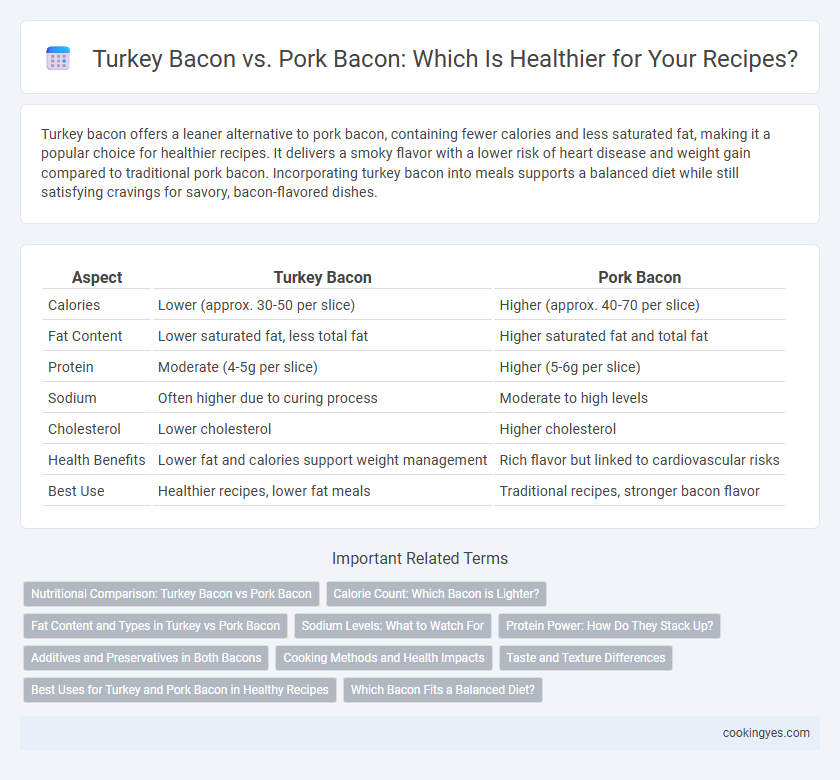Turkey bacon offers a leaner alternative to pork bacon, containing fewer calories and less saturated fat, making it a popular choice for healthier recipes. It delivers a smoky flavor with a lower risk of heart disease and weight gain compared to traditional pork bacon. Incorporating turkey bacon into meals supports a balanced diet while still satisfying cravings for savory, bacon-flavored dishes.
Table of Comparison
| Aspect | Turkey Bacon | Pork Bacon |
|---|---|---|
| Calories | Lower (approx. 30-50 per slice) | Higher (approx. 40-70 per slice) |
| Fat Content | Lower saturated fat, less total fat | Higher saturated fat and total fat |
| Protein | Moderate (4-5g per slice) | Higher (5-6g per slice) |
| Sodium | Often higher due to curing process | Moderate to high levels |
| Cholesterol | Lower cholesterol | Higher cholesterol |
| Health Benefits | Lower fat and calories support weight management | Rich flavor but linked to cardiovascular risks |
| Best Use | Healthier recipes, lower fat meals | Traditional recipes, stronger bacon flavor |
Nutritional Comparison: Turkey Bacon vs Pork Bacon
Turkey bacon contains fewer calories, less fat, and lower cholesterol compared to pork bacon, making it a popular choice for health-conscious consumers. It provides a higher protein-to-fat ratio, which supports muscle maintenance while reducing saturated fat intake linked to heart disease. Nutritionally, turkey bacon offers a leaner alternative with reduced sodium levels, though it may contain added preservatives to enhance flavor and texture.
Calorie Count: Which Bacon is Lighter?
Turkey bacon contains significantly fewer calories than pork bacon, typically offering around 30 to 50 calories per slice compared to pork bacon's 80 to 100 calories. The lower fat content in turkey bacon contributes to its lighter calorie count, making it a preferred choice for health-conscious recipes. Choosing turkey bacon can reduce overall calorie intake while still providing a savory flavor in dishes.
Fat Content and Types in Turkey vs Pork Bacon
Turkey bacon contains significantly less total fat and saturated fat compared to pork bacon, making it a preferred choice for heart-healthy recipes. Pork bacon typically has around 42 grams of total fat per 100 grams, with a high proportion of saturated fat, whereas turkey bacon averages about 25 grams of total fat per 100 grams and lower saturated fat levels. The lower fat content and healthier fat profile in turkey bacon contribute to reduced calorie intake and better cholesterol management in healthier meal plans.
Sodium Levels: What to Watch For
Turkey bacon generally contains lower sodium levels compared to traditional pork bacon, making it a preferable option for those monitoring their salt intake. However, some turkey bacon brands can have comparable or even higher sodium content due to processing methods and flavor enhancers. Always check nutrition labels carefully to select turkey bacon with reduced sodium levels for healthier recipes.
Protein Power: How Do They Stack Up?
Turkey bacon offers a leaner alternative to pork bacon, containing about 6 grams of protein per two slices compared to pork bacon's 8 grams, making it a favorable choice for calorie-conscious diets. While pork bacon provides more protein per serving, it also comes with higher saturated fat and sodium levels, which can impact heart health negatively. For healthier recipes emphasizing protein power, turkey bacon balances moderate protein content with lower fat, supporting muscle maintenance without excessive calorie intake.
Additives and Preservatives in Both Bacons
Turkey bacon generally contains fewer additives and preservatives compared to pork bacon, often relying on natural curing agents and lower sodium levels. Pork bacon typically includes nitrates, nitrites, and artificial flavorings to enhance taste and shelf life, which may contribute to health concerns when consumed frequently. Choosing turkey bacon with minimal processing can reduce exposure to these additives, making it a healthier option for recipes focused on clean eating.
Cooking Methods and Health Impacts
Turkey bacon offers a leaner alternative to pork bacon, containing fewer saturated fats and calories, making it suitable for health-conscious recipes. Cooking methods like baking or grilling turkey bacon reduce fat content further by allowing excess fat to drain away, while pork bacon typically requires frying, which can increase unhealthy fat absorption. Choosing turkey bacon paired with low-oil cooking techniques contributes to heart-healthy meals by minimizing saturated fat and sodium intake.
Taste and Texture Differences
Turkey bacon offers a leaner alternative to pork bacon, with fewer calories and less saturated fat, appealing to health-conscious individuals. Taste differences are notable, as turkey bacon has a milder, less smoky flavor, while pork bacon retains a richer, savory profile with a distinct umami taste. Texture contrasts include turkey bacon's slightly chewier and less crispy consistency compared to the traditional crisp and fatty texture of pork bacon.
Best Uses for Turkey and Pork Bacon in Healthy Recipes
Turkey bacon offers a lower-fat, lower-calorie alternative to pork bacon, making it ideal for healthier recipes such as breakfast wraps, salads, and sandwiches where reduced fat content is desired. Pork bacon provides a richer flavor and crispy texture, enhancing dishes like salads, soups, and pasta when flavor intensity is prioritized over calorie count. Combining turkey bacon in lean protein-focused meals and pork bacon in moderation can help balance taste and health benefits in diverse culinary applications.
Which Bacon Fits a Balanced Diet?
Turkey bacon offers a leaner alternative to pork bacon, containing fewer calories and saturated fats, making it suitable for those aiming to reduce cholesterol intake. Pork bacon provides a richer source of protein and essential B vitamins but tends to be higher in sodium and fat content, which may challenge heart health if consumed excessively. Choosing turkey bacon supports a balanced diet by lowering fat and calorie consumption while maintaining flavorful options for healthier recipes.
Turkey Bacon vs Pork Bacon for Healthier Recipes Infographic

 cookingyes.com
cookingyes.com